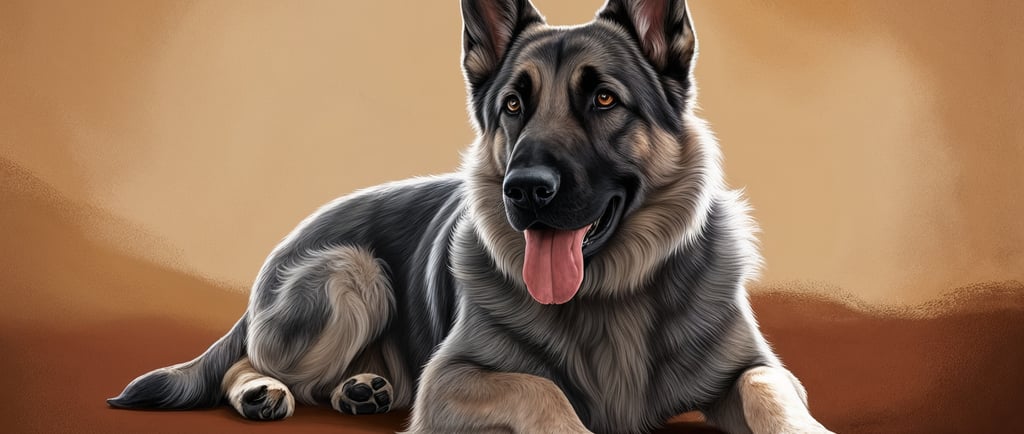How Rin Tin Tin Became Hollywood's First Canine Star
The blog article tells the story of Rin Tin Tin, a German Shepherd rescued from World War I who became Hollywood's first canine superstar, saving Warner Bros. from financial collapse and leaving a lasting legacy in the film industry as a symbol of loyalty and heroism.
10/23/20245 min read


Rin Tin Tin wasn't just Hollywood's first canine superstar; he was the scrappy underdog who quite literally clawed his way to the top—straight out of the trenches of war-torn France. His is a tale of survival, luck, and a Hollywood hustle that saved a major studio from going under. Imagine a pup born into chaos, plucked from a bombed-out kennel in the thick of World War I, only to become one of the biggest names in silent film. It’s a story that’s got everything—war, resilience, Hollywood glitter, and a loyal four-legged hero with a face that could sell out theaters. This is the story of how Rin Tin Tin became the first canine legend of Tinseltown.
It all started in 1918, deep in the ravaged countryside of France. The world was reeling from the final throes of the Great War when a young American soldier named Lee Duncan stumbled upon something unexpected amidst the carnage: a litter of German Shepherd puppies. Hidden in the remnants of a bombed-out kennel, those pups were born into a world of violence and uncertainty. But Duncan saw a spark in one of them—a tiny, scrappy pup that seemed determined to defy the odds. Duncan named him Rin Tin Tin, a moniker inspired by a pair of French good luck dolls that soldiers carried with them. And it seems, just maybe, the name worked.
When Duncan returned to the United States, he didn't come back alone. Rin Tin Tin—or "Rinty," as Duncan affectionately called him—came along for the ride, ready to take on whatever post-war America could throw at him. Duncan, a dog lover through and through, recognized there was something special about Rinty. This was no ordinary dog. There was an intelligence in his eyes, a willingness to learn, and a charisma that went beyond the usual canine companion. Duncan knew he had to show the world what Rinty could do.
So, Duncan got to work. He trained Rinty in agility, obedience, and stunts—turning his already sharp instincts into an act worthy of the stage. The duo began performing at small shows, starting out at local events around Los Angeles. Rin Tin Tin’s skills were remarkable, and it wasn’t long before people started to take notice. Then, in a twist of fate, Duncan and Rinty’s lives changed forever at a small-time dog show. It was there that a filmmaker—struggling to shoot a scene with an uncooperative wolf—caught sight of the German Shepherd who was clearly born for the spotlight.
Rin Tin Tin was brought in as a stand-in, and it wasn’t long before he stole the show—and the hearts of everyone on set. The dog’s incredible performance in "The Man from Hell's River," a 1922 silent film, caught Hollywood’s attention, and suddenly, Rinty was on his way to becoming a bona fide star. He wasn’t just another animal actor; Rin Tin Tin had that elusive “It Factor” that could make audiences believe he really was the hero saving the day—which, of course, he often was.
The timing couldn’t have been better. Hollywood was still figuring itself out in the early 1920s, and studios were scrambling to find that magic formula that could keep audiences flocking to theaters. Enter Rin Tin Tin—the hero that America didn’t know it needed. With his expressive face, lightning-fast agility, and undeniable charisma, Rin Tin Tin quickly became Warner Bros.'s golden ticket. In fact, legend has it that during the studio’s most financially fragile years, it was Rin Tin Tin who kept the lights on. He wasn’t just a dog; he was a box office sensation, earning up to $6,000 per week—a staggering amount at the time.
Rin Tin Tin’s filmography reads like the catalog of a true Hollywood action star. From saving damsels in distress to single-handedly (or single-pawedly) catching the bad guys, he was the canine equivalent of a superhero, bringing in crowds who couldn’t get enough of his on-screen derring-do. His films were pure escapism—a chance for audiences to lose themselves in adventure, where a brave German Shepherd could save the day and remind people that there was still good in the world, even after the horrors of war. He starred in movies like "Clash of the Wolves" (1925) and "Where the North Begins" (1923), each time playing the heroic dog audiences would root for with all their hearts.
But beyond the stunts and the spectacle, there was something else that drew people to Rin Tin Tin. He had a way of emoting on screen that made it easy to forget you were watching an animal. There’s a story that’s almost too good to be true—that Rin Tin Tin received the most votes for Best Actor at the first-ever Academy Awards. Sure, the Academy ultimately decided that a human actor should take home the prize, but the fact that Rinty was even considered speaks volumes about his impact on the industry.
Rin Tin Tin’s popularity wasn't just about entertainment; it sparked a full-blown cultural phenomenon. His success on the silver screen helped catapult the German Shepherd breed into the spotlight, making it one of the most popular dog breeds in America. Families wanted a dog like Rinty—loyal, brave, and intelligent. And it wasn’t just the movies. Rin Tin Tin was everywhere—appearing in advertisements, comic strips, and even a radio show. He became a symbol of hope and heroism, embodying the ideals of loyalty and courage that resonated deeply with a country recovering from war and inching towards prosperity.
Lee Duncan, who had been with Rin Tin Tin from the very beginning, remained his biggest advocate and closest friend. Their bond was something special—a man and his dog, navigating the strange, glamorous world of Hollywood together. Duncan often spoke of Rinty not just as a pet or a performer, but as a partner, someone who had shared in the highs and lows of his life. Together, they lived through the evolution of the film industry—from silent films to talkies—and even though Rin Tin Tin’s career peaked during the silent era, his legacy continued well beyond.
When Rin Tin Tin passed away in 1932, it was like Hollywood itself had lost a legend. Newspapers ran obituaries as though he were a beloved human star, and fans mourned the dog that had given them so many moments of joy and adventure. But even death couldn’t put an end to Rin Tin Tin’s story. Duncan had made sure that Rinty’s bloodline would live on, and he continued to train Rin Tin Tin’s descendants, ensuring that the legacy would not fade away. In fact, Rinty’s descendants went on to star in future films and television shows, bringing the name Rin Tin Tin to new generations.
Rin Tin Tin may have been Hollywood’s first dog star, but his influence went far beyond the screen. He saved Warner Bros. from financial collapse, helped define what a movie star could be, and gave audiences a reason to cheer during a tumultuous time in history. He was the ultimate underdog—born into war, rescued by a soldier, and transformed into a symbol of courage and loyalty. It’s a story that’s almost too wild to be true, but that’s what makes it quintessentially Hollywood.
In the end, Rin Tin Tin wasn’t just a dog. He was a legend. He proved that stardom wasn’t just reserved for humans and that sometimes the most unlikely heroes can have the biggest impact. His paw prints are all over Hollywood history, a reminder that even in a town built on fantasy, the bond between a man and his dog can be the stuff of true legend.
To discover a whole range of products about this fantastic breed please click the Amazon UK link below.
This post contains affiliate links to German Shepherd products on Amazon – I may earn a small commission if you make a purchase through these links, at no extra cost to you."
